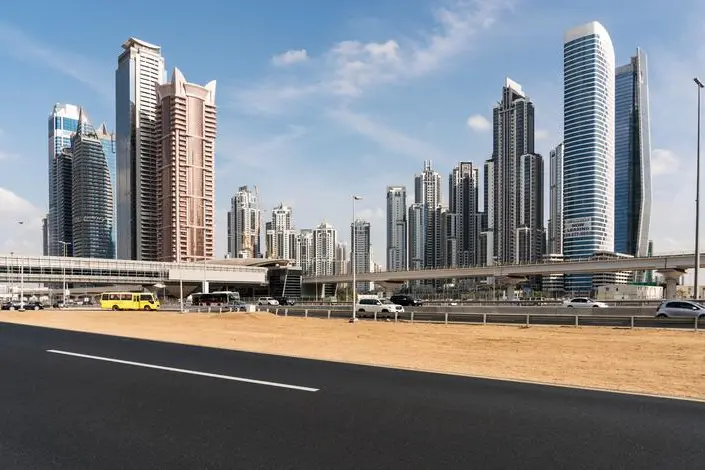PHOTO
Dubai – The UAE's real estate market has been in a constant tug-of-war in terms of rising supply and falling demand.
Despite that, a top asset management executive highlights that these challenges are temporary and will be soon overcome, indicating that recovery is already underway with prices reaching attractive levels and government decisions helping to support the market.
In an interview with Mubasher, Iyad Abu Huij, managing director of Regulus Asset Management, forecasts that the UAE's property market will recover after the correction which began in 2014, citing promising indicators.
Dubai's eight-spot global ranking advancement on the Global Real Estate Transparency Index will help support the market in general, Abu Huij adds. Dubai has advanced to 40th place on the index.
Regulus Asset Management is one of the investors and founders behind Al Masah Capital, a leading investment company in the MENA region.
Below is an exclusive interview with Regulus Asset Management's managing director Iyad Abu Huij.
Q: Is the real estate sector undergoing an unprecedented recovery stage, especially after the recent government decisions?
Iyad Abu Huij: Yes, from the correction seen in real estate prices during 2014/15, the market is now showing some encouraging signs of underlying price support.
Key factors for the same have been the recovering in oil prices in the recent months which has uplifted the overall macro outlook for the UAE and the broader GCC region.
The increased transparency of the overall real estate market evidenced by increase in Dubai’s global ranking in the Global Real Estate Transparency Index by eight positions to 40.
Q: Do you think that government decisions have already changed the course of the declining sector?
Iyad Abu Huij: Yes, some of the decisions undertaken by the government like mandatory unified Ejari leasing contracts, classification of all non-freehold plots in Dubai, adoption a unified lease form, etc. have helped in standardizing contracts and consequently, improving the transparency across the overall sector.
Moreover, the recently announced decisions to grant 10-year residency visas for professionals, investors, scientists and meritorious students in addition to 100% foreign ownership in companies is expected to have a significant positive impact on the property market, both residential and commercial. End-user expatriates who have earlier chosen to rent property in the UAE could now consider buying a home, given the long term legal clarity available now.
Q: Will the increase in the expected interest rate during the current year affect the movement of the sector?
Iyad Abu Huij: The latest interest rate hike by the US Federal Reserve was already factored in and priced into the market, so no significant impact of the same was felt in the UAE and rates remained stable.
Although future anticipated rate hikes might make buying via mortgages less attractive, however, with many affordable housing projects being handed over, expats wishing to stay in the UAE.
Q: Do you think prices have become in an attractive levels?
Iyad Abu Huij: As I just mentioned, Dubai has very much been a buyers’ and renters’ market over the course of 2017 with sales prices and rents sliding across several areas. The upcoming new inventory in the market will provide even more attractive opportunities to end users who are considering owning a home in the UAE.
This uptick in demand will consequently help in bolstering the property prices in the longer run which bodes well for property developers as well.
Q: What is the benefit of large real estate companies such as Aldar and others in Abu Dhabi from the stimulus plan announced by Sheikh Mohammed bin Zayed recently?
Iyad Abu Huij: The stimulus plan announced by Sheikh Mohammed Bin Zayed call for a comprehensive review of Abu Dhabi building regulations for both private and commercial property construction, thereby reducing costs for all the stakeholders involved i.e. citizens, residents and property developers like Aldar in addition to promoting urban development.
The plan also envisages large-scale development of land holdings with an emphasis on promoting tourism, thereby, further promoting real estate development.
Q: What are the expectations for the sector and the pace of implementation of its projects before the Expo 2020?
Iyad Abu Huij: The positive effects of the upcoming Expo 2020 are already evident with the completion/pipeline of projects such as the Dubai Water Canal, numerous theme parks and the Museum of the Future.
Other infrastructure developments prior to the Expo, like the new mass transit connections are expected to be the main driver for an uptick in the overall real estate market before the actual event, encouraging both buyers and investors to invest in the economy taking into consideration the expected infrastructure developments.
Q: Is there really a slowdown in the Market or was there a slowdown and what its causes?
Iyad Abu Huij: The overall real estate sector has faced numerous headwinds over the last couple of years, including low oil prices, pressure from budget-conscious residents for affordability and widespread corporate mergers, which led to shrinking office and housing requirements in addition to forcing landlords to lower rents.
However, the upcoming Expo 2020 in addition to the recently announced slew of measures announced by the UAE Government are expected to provide a significant upside in terms of demand for the overall UAE real estate market.
All Rights Reserved - Mubasher Info © 2005 - 2018 Provided by SyndiGate Media Inc. (Syndigate.info).





















